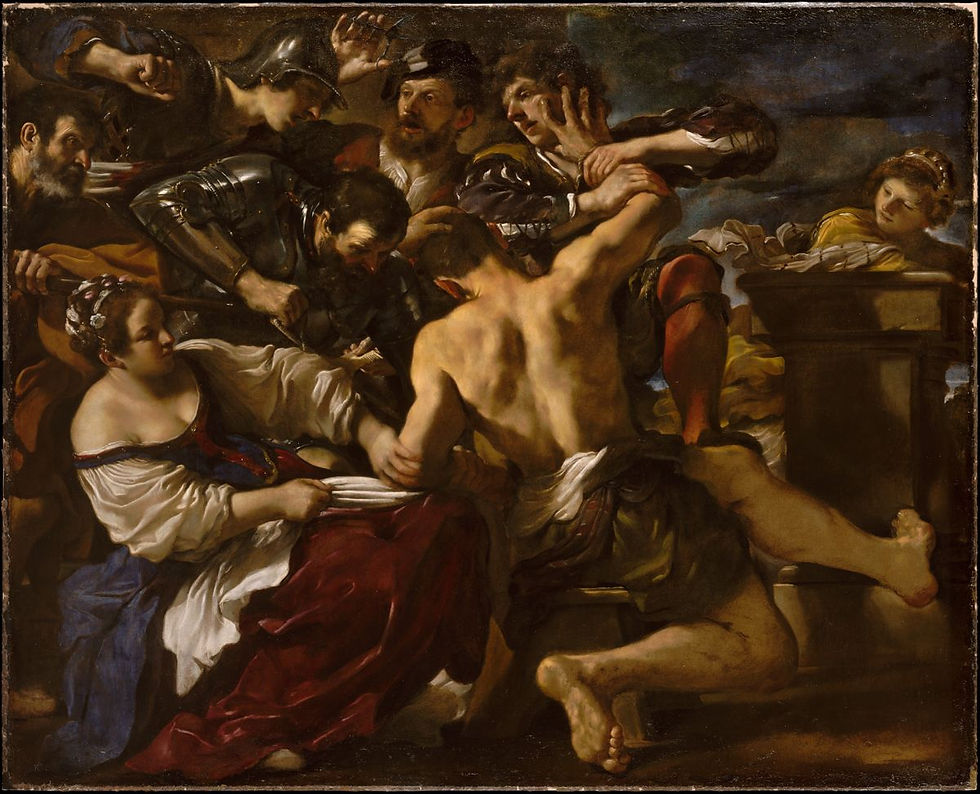Verse 20:[1] And she said, The Philistines be upon thee, Samson. And he awoke out of his sleep, and said, I will go out as at other times before, and shake myself. And he wist not that the LORD (Num. 14:9, 42, 43; Josh. 7:12; 1 Sam. 16:14; 18:12; 28:15, 16; 2 Chron. 15:2) was departed from him.

He awoke out of his sleep, and said within himself, that is, he purposed and attempted it.
[Just as previously, כְּפַ֤עַם בְּפַ֙עַם֙] Verbatim: according to an occurrence on an occurrence: that is, as previously, also at this time (Vatablus).
[I will shake myself[2] (thus Montanus, Septuagint, Vatablus, Drusius, Pagnine)] Either, 1. from sleep (Drusius, Munster): or, 2. from the bonds wherewith she had bound him, to know for sure if he were able to break his bounds; as to which, since he was not able, the Philistines took possession of him securely (Lyra). But Samson was not yet actually bound (Drusius). Or, 3. from their hands; that is, I will escape (Vatablus). When I have shaken myself (Junius and Tremellius).
Shake myself, that is, put forth my strength to crush them, and to deliver myself. He wist not; being not yet well awake, and not distinctly feeling the loss of his hair, or not duly considering what would follow upon it.

[The the Lord had departed from him] With respect to the grace freely given, that is, Samson’s strength (Menochius).
The Lord was departed from him; in respect of the strength and help he had formerly given him.
[1] Hebrew: וַתֹּ֕אמֶר פְּלִשְׁתִּ֥ים עָלֶ֖יךָ שִׁמְשׁ֑וֹן וַיִּקַ֣ץ מִשְּׁנָת֗וֹ וַ֙יֹּאמֶר֙ אֵצֵ֞א כְּפַ֤עַם בְּפַ֙עַם֙ וְאִנָּעֵ֔ר וְהוּא֙ לֹ֣א יָדַ֔ע כִּ֥י יְהוָ֖ה סָ֥ר מֵעָלָֽיו׃
[2] Hebrew: וְאִנָּעֵר, in the Niphal conjugation.
Excellent post today, Dr. Dilday. The quote from Thomas Brooks especially encouraged my heart this morning. The Hebrew word for the day from this text is the verb נָעַר
The meaning of this word is to shake, as to shake out or off. Further, it has the word picture of the rustling of a lion's mane, followed by the lion's roar. And to answer your question, Dr. Dilday, I think נָעַר is in the Niphal because it seems to me that Samson could "be shaken" (passively speaking) from the Philistine's as he had before. That is, it would not take much effort, thus he presumed all was well with him as before. But not the case. Any thoughts on this…
Thomas Brooks' Heaven on Earth: 'Get and keep communion with God. Your strength to stand, and your strength to withstand all assaults, is from your communion with God. Communion with God is that that will make you stand fast, and triumph over all enemies, difficulties, dangers, and deaths.
While Samson kept his communion with God, no enemy could stand before him, he goes on conquering and to conquer, he lays heaps upon heaps; but when he has fallen in his communion with God, he falls presently, easily, and sadly before his enemies.
So long as David kept up his communion with God, no enemies could stand before him; but when he was fallen in his communion with God, he flies…
Matthew Henry: 'What little concern he himself was in at it, Judges 16:20. He could not but miss his hair as soon as he awoke, and yet said, "I will shake myself as at other times after sleep," or, "as at other times when the Philistines were upon me, to make my part good against them." Perhaps he thought to shake himself the more easily, and that his head would feel the lighter, now that his hair was cut, little thinking how much heavier the burden of guilt was than that of hair. He soon found in himself some change, we have reason to think so, and yet wist not that the Lord had departed from him: he did no…
Hebrew:
1. It seems to me that כְּפַ֤עַם בְּפַ֙עַם֙ is begging for further exposition. Thoughts?
2. What is the significance of וְאִנָּעֵ֔ר in the Niphal?